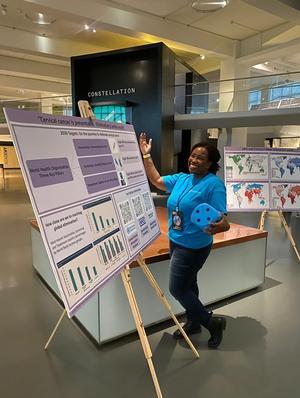Dr Angeli Arthur, Consultant Histopathologist
Histopathology is vast and you get to pick a few specialties that you find interesting and that you would like to focus on. There are many opportunities during your training, and even in your career as a consultant, to explore the specialties that interest you. It is never too late to change your interests either.

Can you tell us what histopathology is?
Histopathology is the study of tissues and cells to make a diagnosis that helps clinicians manage patient care. Histopathology is at the front line in using cutting edge molecular techniques in prognosis and diagnosis. Some centres even use digital pathology to report cases instead of microscopes!
Can you tell us about your average working day?
I am a newly qualified consultant histopathologist. My day mostly consists of reporting cases in my specialties of interest. As you progress through training you will build a portfolio of cases that you’ll sign out independently, and the remaining cases will be double reported with a supervising consultant. My working days may also include dissection of specimens. Each subspecialty in histopathology will have multidisciplinary team meetings, where you will review the pathology discussion with other professionals that are involved in the care of the patient.
What kind of work does your job involve?
Histopathology is like being a medical detective. It is piecing together multiple pieces of information and correlating it with any available clinical and radiological findings. Some histopathologists perform autopsies.
Why did you choose this specialty?
I was drawn to histopathology as a career because I enjoyed learning and understanding about disease processes and the diagnostic pathway in medical school. I also liked that histopathology is vast and you get to pick a few specialties that you find interesting and that you would like to focus on. There are many opportunities during your training, and even in your career as a consultant, to explore the specialties that interest you. It is never too late to change your interests either.
In histopathology you have time to think and process the application of medical and surgical knowledge to come to a diagnosis. Histopathology allows a great deal of independent work, but you will also work closely with your colleagues in discussing difficult cases.
If you’re someone that enjoys problem solving, are organised and pay great attention to detail, histopathology is a great career for you. Though you may not see patients face-to-face as much as in other specialties, you are still involved in the management of patients.
What do you enjoy most about your chosen specialty?
I enjoy how varied my days can be! Even at its busiest histopathology offers space and time to find other interests that are still related to the specialty. I especially enjoy being involved in medical education and training, but there is time for research if that is an interest you have.
Having a more predictable working hours means it is easier to take up other interests that you enjoy or maybe never had time to consider before. I have had time to take up playing the violin again. I also enjoy being involved in public engagement with the royal college, and recently presented a gynaecology pathology related session at the science museum.
What do you find most rewarding about the role?
You realise how integral histopathology is in the patient care pathway. You help make diagnostic decisions, influence treatment and help monitor disease. From so-called straight forward to challenging cases you provide answers to core clinical questions.
What advice would you give to students looking to enter your field?
Take the opportunity on any of your clinical rotations to attend a multidisciplinary team meeting, as that’s the perfect opportunity to see how histopathologists contribute to patient management. Introduce yourself to the histopathologist who would be all to happy to talk to you about their career.
Arrange time in taster sessions as a medical student or even arrange an elective in a department. Some foundation programmes even have rotations in histopathology to experience a longer rotation in histopathology. You can get involved with student events and competitions that the RCPath organise, or attend conferences with organisations like BDIAP and Pathsoc.
